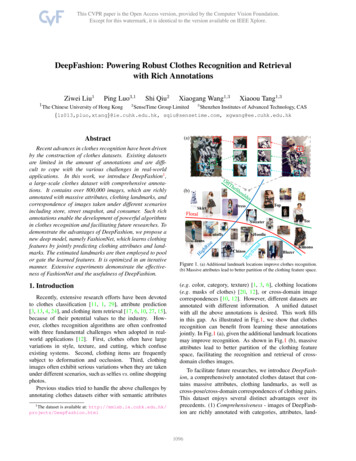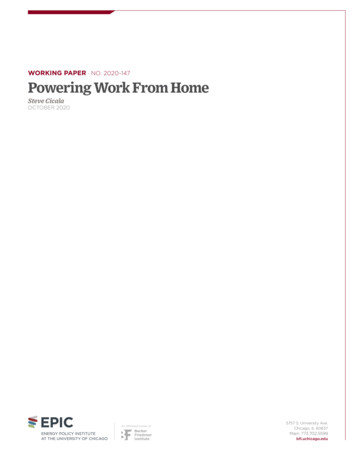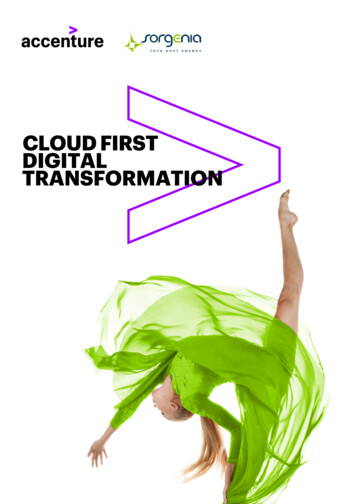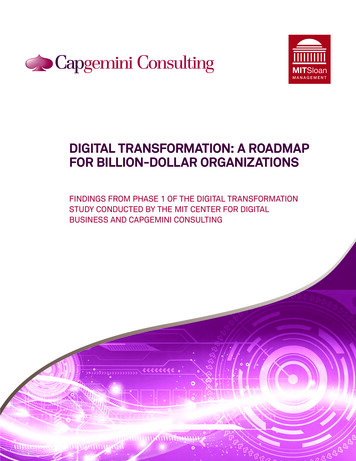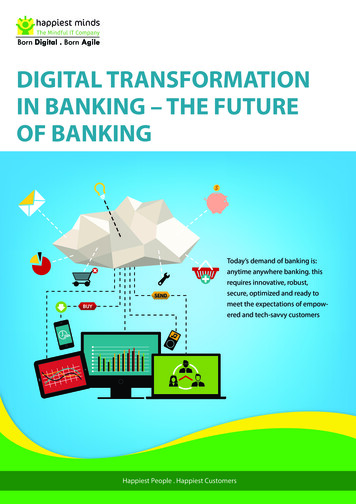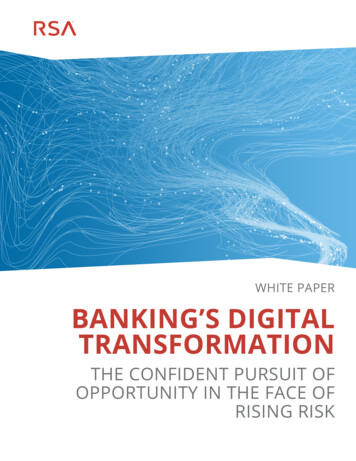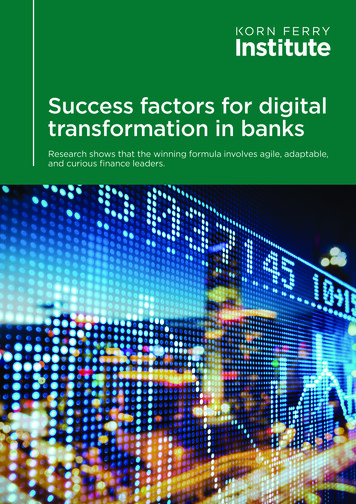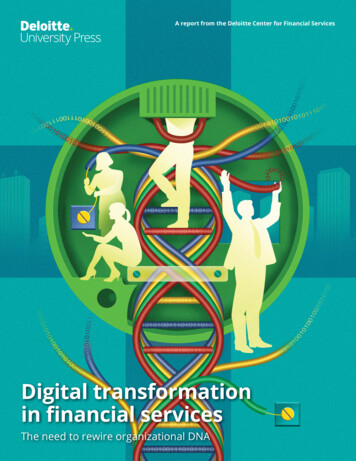
Transcription
Digital Transformation:Powering the Great ResetJ U LY 2 0 2 0
Contents3Executive summary4Reimagining digital transformation: leadership perspectives6The rising urgency of digital transformation8Opportunity 1: Transform business11Opportunity 2: Empower stakeholders12Opportunity 3: Change systems13Conclusion14Appendix 1: Executive Working Group15Contributors16Endnotes 2020 World Economic Forum. All rightsreserved. No part of this publication maybe reproduced or transmitted in any formor by any means, including photocopyingand recording, or by any informationstorage and retrieval system.Digital Transformation: Powering the Great Reset2
Executive summaryCOVID-19 has irrevocably changed our world.During COVID-19, we have had to learn how tolive differently – to learn, work, socialize, shop,worship and collaborate in different ways. Andmany of us are doing all this virtually. The pandemicis therefore a watershed moment for the digitaltransformation of business. The rules for successhave changed, and are ever more reliant onharnessing the power of digital models to createnew value and experiences.Digital transformation is not a new endeavour forbusiness, though prior attempts have often failedto realize its full potential. What is new in the wakeof COVID-19 is that this is a shared opportunityfor leaders. Successful leaders will now seize theopportunity to advance a new trajectory for digitaltransformation that aligns with the changing roleof business: to be a powerful enabler of long-termvalue creation for all of its stakeholders.This paper explores the increasing yet evolving roleand relevance of digital transformation in businesstoday. It offers an opening frame for a multiyear,cross-industry programme to co-create the newplaybooks for executive decision-making and actionin a post-pandemic business normal. It presentsthree opportunities for digitally enabled corporateleadership to support the Great Reset1 of oureconomies and societies:1. Transform into a digital business acrossseven dimensions: new value creation;digital-at-the-core business models; intelligentand agile operating models; localized andresilient supply chains; real-time decisions atthe edge; data-driven investment decisions;and augmented talent2. Empower all stakeholders: employees,consumers, suppliers, partners, governmentand society3. Effect systems change through digitally enabledcollaboration models that correct market failuresIn 2020 and beyond, the Accelerating DigitalTransformation programme, facilitated by the WorldEconomic Forum, will support conversations andcollaborations among the members of a growingcommunity of leaders who are redefining digitalbusiness transformation as an engine of futurevalue for both their organizations and society.REUTERS/ALY SONGDigital Transformation: Powering the Great Reset3
Reimagining digitaltransformation:leadership perspectivesAntonio NeriPresident and Chief ExecutiveOfficer, Hewlett Packard Enterprise(Chair, Digital TransformationCEO Champions Group)Julie SweetChief Executive Officer, AccentureC VijayakumarChief Executive Officer, HCLTechnologies (Chair, InformationTechnology Industry Community)Accelerated by the global pandemic,we are entering the next wave of digitaltransformation – an Age of Insight. Wemust leverage technology to discoverinsights that elevate the greater well-beingof every human on this planet.2020 begins the decade of delivery forthe promise of technology. Digitaltransformation is a powerful enabler of thegreat reset, to generate sustainable valueand shared success.The year 2020 challenged us tocompletely rethink our enterprise growthstrategies and the global economy at large.Digital transformation can ensure thischange is sustainable and purpose-driven.Stephen KlaskoChief Executive Officer, JeffersonHealth (Co-Chair, StewardshipBoard on Digital Economy)The pandemic has accelerated themobile, digital world that we’re entering.Our work is to ensure that we guide thetechnology revolution in ways that areethical and responsible. Trust will be thekey to the future.Frans van HoutenChief Executive Officer,Royal PhilipsBy embracing informatics, analytics andAI, we can use the COVID crisis to quicklyreimagine healthcare, to give peopleimproved access to affordable and qualitycare, with a much better experience andhigher productivity.Gisbert RühlChief Executive Officer, KlöcknerThe COVID crisis highlighted thecriticality of digital transformationof business, industry and society.Responsible leaders will take theopportunity now to drive a longterm change.Digital Transformation: Powering the Great Reset4
Wendy Lucas-BullChairman, Absa GroupRobert F SmithChairman and Chief ExecutiveOfficer, Vista Equity PartnersMauricio RamosChief Executive Officer,Millicom International Cellular(Chair, Digital CommunicationsIndustry Community)Digital business and operating modelscan effect a step-change in financialinclusion and service delivery to millionsin markets such as Africa. We must act onthe opportunity now.The Great Reset is vital to modernizingcapitalism. Digital transformation, togetherwith chief executive officer leadership anddeployment of 2% of corporate profits overthe next 10 years, can eliminate banking,healthcare, education, broadband andfood deserts in minority communities andgrow our economies by trillions of dollars.Connectivity has proven to be thelifeblood of our economies and societiesand will be equally critical for digitaltransformation of industries as we moveinto the new normal.Takahito TokitaChief Executive Officer,Fujitsu LimitedCOVID-19 is entirely and irreversiblychanging our lives and work. Harnessingthe power of digital transformation,business leaders should make the worldmore sustainable by building trust insociety through human-centric innovation.Stephanie LinnartzGroup President, MarriottInternationalThe pandemic has altered the simpleacts of hospitality that are the foundationsof business and society. Digitaltransformations must enhance humanconnection, anticipating the day we will allbe together again.Badr JafarChief Executive Officer,Crescent EnterprisesPat GelsingerChief Executive Officer, VMWareJane Sun JieChief Executive Officer,Trip.com GroupCOVID-19 has created a windowof opportunity for technologicalleapfrogging. Our ability to rechargethe economy and create jobs is largelydependent on concerted efforts toaccelerate digital transformation,especially within SMEs.These unusual times are permanentlychanging the way we work, learn,connect, worship and live. I firmly believeit is within our power to transform theturmoil of this challenging time into arecovery that creates opportunity forthose who need it most.The world is becoming rapidly digitallydriven. It has never been more criticalfor us to embrace these technologies toempower customers, transform businessand create opportunity.Digital Transformation: Powering the Great Reset5
The rising urgency ofdigital transformationFor consumers, employees and partners, theshift in behaviour has been swift and dramatic.Since the onset of the COVID-19 crisis,internet usage has risen by 70%,2 the use ofcommunication apps has doubled,3 and somevideo streaming services have seen daily usagerise 20-fold.4 Never have we been so aware of ourdependence on digital models, and we are notgoing back.With the power of digital technology so very visible,leading companies must now use technology totransform business itself to deliver for a broader setof stakeholders.5The world goes digital146% year-on-year growthin April 2020 in online retailorders in North America6More than 25% ofconsumers use mobiledevices for purchases at leastonce a week722% growth in global venturecapital investment in EdTechcompanies in the first quarterof 20208160% expected increasein frequency of digitalpurchases, as reported byglobal consumers1048% of employees willlikely work remotely at leastpart time post-COVID versus30% pre-COVID1120% expected annual growthin telemedicine through2020–202412China’s online educationmarket is expected to morethan triple to 99.3 billion in2023 from 20199The digital dividend is gigantic 20182023Digital laggardsmissed out on 15%in foregone revenuesin 2018, which couldgrow to 46% of annualrevenue in 202315“Digital natives” and companies that started earlyon their digital transformation journeys have oftenbetter withstood the current crisis and adaptedfaster to new human and societal needs. Evenbefore COVID-19 hit, digital leaders were seeingtwice the revenue growth of laggards, a trendexpected to accelerate.13 Some 47% of incumbentcompanies who pivoted to competing in newdigital ways have achieved organic growth greaterthan 10% over the past three years. Only 30% oftraditional incumbents have done the same.14 and the digital divide is gapingWhen COVID-19 hit, many disadvantagedcommunities, lower-paid workers and smallbusinesses lacked the resources or capabilities toadjust to this new, more digitally demanding world.45% of householdsglobally do not haveaccess to the internet,and only 19% haveaccess in the leastdeveloped countries16Job displacements caused by automation and thegrowing skills gap have heightened difficulties. Smallbusinesses, which constitute 40–60% of nationaleconomies globally, have often had to confrontlimited access to digital connectivity or remotework, great reliance on cash-based transactionsand massive demand uncertainties caused byshifting consumer behaviour.Digital Transformation: Powering the Great Reset6
Time to shift gears: add purposeto digital transformation50%of chief executiveofficers believe thecrisis will acceleratethe move towardsstakeholdercapitalism, and77% believe it willspeed up their digitaltransformations19Among the many trends that COVID-19 hasaccelerated, two stand out: Calls are risingfor companies to lead in addressingsocietal challenges, and the marketplaceis indicating that companies must adopt digitalbusiness models at their core to compete.Before COVID-19 hit, the business landscape wasalready becoming more competitive and volatile.In the mid-20th century, the average Fortune 500company lasted 75 years. Today, that average is15 years, thanks to technology disruption.17 Digitalleaders are rewriting the rules of competition,putting more companies’ survival at risk, whilethe pandemic adds further disruption andaccentuates calls for a Great Reset of oureconomies and societies.The time has come for companies to combinethe two agendas – they must use digitalbusiness models and Fourth Industrial Revolutiontechnologies to transform their businesses andlead systems change at scale. Many are alreadyadvancing on this path. In May 2020, a Fortunesurvey found that roughly half of chief executiveofficers believe the crisis will accelerate themove towards stakeholder capitalism, and 77%say it will force their companies to speed up theirdigital transformations.18Amid the uncertainty as to what behaviours andtrends from the crisis will endure, this much isclear: Updating their business for a digital-firstworld, led by purpose, is now an imperative foralmost every company.Three opportunities for corporate leadershipFIGURE 1:As companies seize the opportunity tointegrate purpose with profit and invest in digitaltransformation to help deliver on their purpose,leaders can use digital transformation to createvalue along three inter-related paths:–Empower stakeholders: Use technologyto respond to the needs and priorities ofa broader set of stakeholders, includingemployees, consumers, partners,governments and society.––Change systems: Create new collaborationand value-creation models across ecosystemsto address global challenges through newmarkets and enable systemic change.Transform business: Reorient digitaltransformation investments and initiativesto drive sustained, long-term value for thecompany and beyond.Three opportunities to drive purpose-led digital transformationOpportunity 3:Change systemsOpportunity 2:Empower stakeholdersOpportunity 1:Transform businessDigital Transformation: Powering the Great Reset7
Opportunity 1:Transform businessOnly13%of leaders saytheir organizationsare ready for thedigital age22Companies are estimated to have spent 1.2 trillionon digital transformation efforts in 2019,20 yet only13% of leaders say their organizations are ready forthe digital age.21Companies can and must do better, as clearlyshown by COVID-19’s combination of dramaticdemand shocks and need to operate remotely.The shift to digital technologies must be structural,going beyond incremental efficiencies to transformoperating and business models so that companiescan continue to deliver for customers. The crisisobliges companies to redefine not just theiroperating models and value delivery to customers,but also their business models and implications totheir cost or revenue structures.More and more voices are also calling for a newform of capitalism – one that produces macrooutcomes that are better aligned with our humanand environmental needs.The answer to these demands is to consciouslyshape new digital business models that delivergreater value to both shareholders and a wider setof stakeholders. To do so, companies will have todetermine where new value exists, which businessmodels will capture it, and which technologies willsupport the adaptability and resilience that thesemodels require. They will have to use data to powerbetter decision-making, optimize finance and freeup capacity for investment.Organizations will therefore have to reassess nearlyevery aspect of their business, guided by a clearlyarticulated vision. This section offers a path toexecute that reassessment, create that vision andguide the digital transformation journey.Digital transformation in the new normal:the seven dimensionsThe nature and pace of digital transformationswill vary across companies, and be influencedby their size, industry, digital maturity andcapabilities. However, amid the different digitaltransformation prioriti
the next 10 years, can eliminate banking, healthcare, education, broadband and food deserts in minority communities and grow our economies by trillions of dollars. Robert F Smith Chairman and Chief Executive Officer, Vista Equity Partners . Digital Transformation: Powering the Great Reset 6 The rising urgency of digital transformation For consumers, employees and partners, the shift in .

